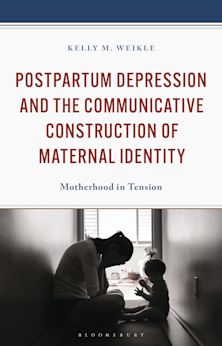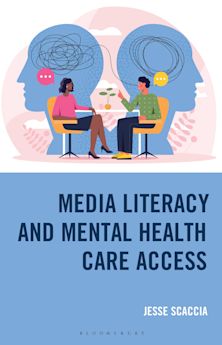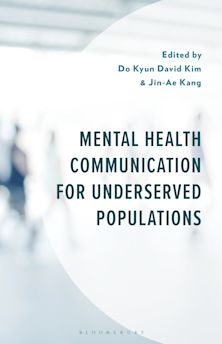- Home
- ACADEMIC
- Communication Studies
- Health and Science Communication
- Narrating Patienthood
Narrating Patienthood
Engaging Diverse Voices on Health, Communication, and the Patient Experience
Peter M. Kellett (Anthology Editor) , Ashley M. Archiopoli (Contributor) , Ann D. Bagchi (Contributor) , Ambar Basu (Contributor) , Russell Brewer (Contributor) , Gina Brown (Contributor) , Laura Brown (Contributor) , Barbara Cardell (Contributor) , Katherine M. Castle (Contributor) , Joyeeta Dastidar (Contributor) , Crystal Daugherty (Contributor) , Meta Smith Davis (Contributor) , Patrick Dillon (Contributor) , Ari Hampton (Contributor) , Adam Hayden (Contributor) , Elizabeth A. Hintz (Contributor) , Krista Hoffman-Longtin (Contributor) , Alexis Zoe Johnson (Contributor) , Vanessa Johnson (Contributor) , Jody Kellas (Contributor) , Peter M. Kellett (Contributor) , Andrea Meluch (Contributor) , Jennifer E. Ohs (Contributor) , Mark P. Orbe (Contributor) , Dwight Peavy (Contributor) , Rachel M. Reznik (Contributor) , Andrew Spieldenner (Contributor) , Laurel Sprague (Contributor) , Maria K. Venetis (Contributor) , Jill Yamasaki (Contributor) , Amanda J. Young (Contributor)
Narrating Patienthood
Engaging Diverse Voices on Health, Communication, and the Patient Experience
Peter M. Kellett (Anthology Editor) , Ashley M. Archiopoli (Contributor) , Ann D. Bagchi (Contributor) , Ambar Basu (Contributor) , Russell Brewer (Contributor) , Gina Brown (Contributor) , Laura Brown (Contributor) , Barbara Cardell (Contributor) , Katherine M. Castle (Contributor) , Joyeeta Dastidar (Contributor) , Crystal Daugherty (Contributor) , Meta Smith Davis (Contributor) , Patrick Dillon (Contributor) , Ari Hampton (Contributor) , Adam Hayden (Contributor) , Elizabeth A. Hintz (Contributor) , Krista Hoffman-Longtin (Contributor) , Alexis Zoe Johnson (Contributor) , Vanessa Johnson (Contributor) , Jody Kellas (Contributor) , Peter M. Kellett (Contributor) , Andrea Meluch (Contributor) , Jennifer E. Ohs (Contributor) , Mark P. Orbe (Contributor) , Dwight Peavy (Contributor) , Rachel M. Reznik (Contributor) , Andrew Spieldenner (Contributor) , Laurel Sprague (Contributor) , Maria K. Venetis (Contributor) , Jill Yamasaki (Contributor) , Amanda J. Young (Contributor)
You must sign in to add this item to your wishlist. Please sign in or create an account
Description
Diversity plays an important role in how people experience illness and healthcare as patients. Listening carefully to stories of how race, class, age, gender, sexuality, and disability can affect patient experience can be revealing and provide much needed change to health communication in the patienthood narrative. This book is a collection of vibrant and engaging essays by scholars of narrative methods in health communication. Each chapter takes readers into the fascinating world of patients who use stories from their personal lives to challenge us to rethink, reimagine, and reformulate what health communication means in practice.
Each section of the book focuses on an important aspect of the theory and practice of the patienthood narrative. Part one explores the important ways that telling and sharing patient’s stories can lead to learning, empowerment, and advocacy. Part two explores several key forms of diversity and how they affect patienthood. Part three illustrates how personal, relational, and cultural aspects of identity intersect to shape the patient experience.
Table of Contents
Chapter 2: From Stories to Discoveries: Patients’ Narratives as Advocacy in Biomedical Research
Chapter 3: Cultural Communication Competency as a Two-Way Street: My Journey from Medical Avoidance to Patient Self-Advocacy
Chapter 4: Who will tell our stories? Emerging health legacies following the 2014-2016 Ebola Epidemic
Chapter 5: African Americans and Hospice Care: On Social Risk, Privacy Management, and Relational Health Advocacy
Chapter 6: Can You Please Direct me to a Doctor That Has a Heart?: A Stage 4 Breast Cancer Patient Narrative
Chapter 7: Exploring the Effects of Patient-Provider Communication on the Lives of Women with Vulvodynia
Chapter 8: Queer Patienthood
Chapter 9: An Autoethnographic Account of Navigating Patienthood as a Person with Hearing Impairment
Chapter 10: From Consumer to Community-Based Researcher: Lessons from the HIV Stigma Index
Chapter 11: The Gendered Nature of Generosity in Post-Hysterectomy “Dear Honey…” Letters
Chapter 12: The Narrative Journey and Decision-Making Process of Plastic Surgery Patienthood
Chapter 13: Narrative Sense-Making in Systemic Lupus Erythematosus
Chapter 14: Healthy mother, healthy baby: An Autoethnography to Challenge the Dominant Cultural Narrative of the Birthing Patient
Chapter 15: Abelist Biases
Product details
| Published | 26 Nov 2018 |
|---|---|
| Format | Ebook (Epub & Mobi) |
| Edition | 1st |
| Extent | 296 |
| ISBN | 9781498585545 |
| Imprint | Lexington Books |
| Series | Bloomsbury Studies in Health Communication |
| Publisher | Bloomsbury Publishing |
About the contributors
Reviews
-
This volume's 15 chapters provide diverse narratives about patients and their experiences mostly within the US health care delivery system. The field of "patienthood" as identified in the title is organized into three sections devoted to research, practice, and health care encounters. Part 1 contains four chapters that explain personal patient experiences as well as global patient advocacy. Part 2 examines how cultural differences, identities, and disabilities impact health behaviors, health disparities, and health communication. Part 3 details various health communication and patient caregiver encounters, including comparing one individual's varying health care experiences as a patient, a provider, and a family member. Kellett, professor of communication studies at UNC Greensboro, assembles the essays and furnishes a well-organized, contextualizing preface. Each chapter contains references, and there is a helpful index at the back. The book is a useful companion to Bo Snyder's The Patient Experience: Helping Physicians Improve Care (2015). This text is a worthwhile addition to collections in pediatric and family practice medicine, health communication, and public health.
Summing Up: Recommended. Advanced undergraduates through faculty and professionals.Choice Reviews
-
This groundbreaking book is an important step to balancing understanding of key health communication issues by vividly presenting the sincere voices and experiences of health care consumers through first-hand personal narrative accounts of their significant health experiences. This is a critically important book that provides direction and evidence for employing the perspectives of health care consumers to fully understand major communication needs and issues in the delivery of care and promotion of health. It also provides wonderful examples of how to use narrative ethnographic health communication research effectively as a rich and revealing method for understanding consumers' experiences of health and health care.
Gary L. Kreps, George Mason University
-
Narrating Patienthood invites us to listen with our hearts to understand the harsh realities of borders created through prejudice, discrimination, stereotyping, and cultural misunderstandings in ways that limit access, marginalize, and silence the voices of people desperately in need of care. Each chapter in this book demands our attention, offering engaging and thought-provoking insights of the ways we communicate through these borders to form communities of care with other patients, providers, and family members and together construct compelling truths of advocacy, empowerment, and change in our health care systems.
Patricia Geist-Martin, San Diego State University

ONLINE RESOURCES
Bloomsbury Collections
This book is available on Bloomsbury Collections where your library has access.


































